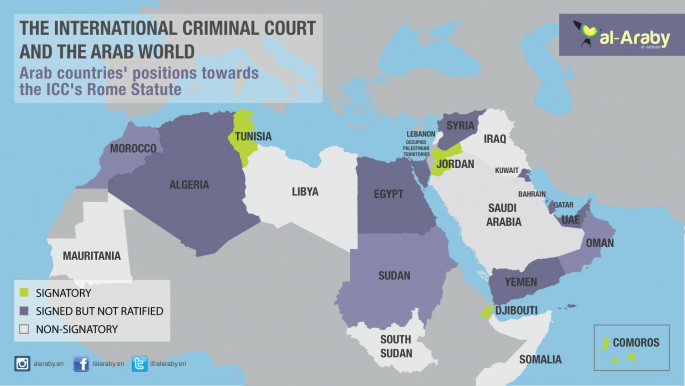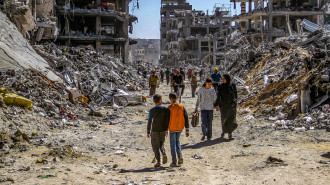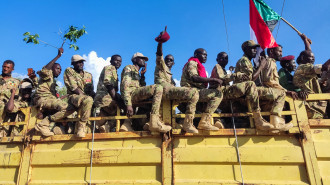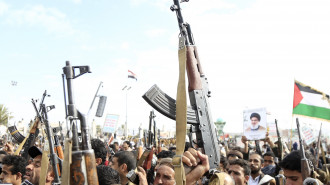No justice in sight for Syria's victims
In the spring of 2011, a swell of popular uprisings felled a number of the Arab world's dictators, one-by-one.
A new era appeared imminent, but Syria's leader, Bashar al-Assad, fought tooth and nail to stay in power.
The Assad example
After more than four years of fighting in Syria, those responsible for major war crimes remain without charge.
Many believe that Assad, who came to power exactly 15 years ago on Friday, is getting away with murder.
"One of the drivers for the war in Syria is that there is no accountability for those who are directing, or carrying out, the worst of the crimes," said Neil Sammonds, Amnesty International's Syria researcher.
"If people are able to direct barrel bombs on civilian areas - abduct and kill captives knowing that nothing is going to happen to them - there's not going to be a break to what is happening."
Even from the first days of the uprising, Amnesty International said it believed war crimes had taken place in Syria.
The international community was divided - no action was taken - and now beheadings and barrel bombs are a daily feature of Syrian news.
As many as an estimated 300,000 people have died in the conflict and Syria has become a theatre of cruelty and impunity.
Extremist armed groups thrive in the periphery, while regime militias murder at will.
| Click to enlarge |
 |
Many in the opposition doubt Yarmouk could have been starved, or Ghouta hit with gas, had international prosecutors been taking note earlier.
"An International Criminal Court referral would be the first and most comprehensive way for a message to be sent out to people that justice will be served in Syria," Sammonds said. "This would serve in tempering down the crisis."
Victim to politics
The people of Syria have not only been victims of Assad but also international power politics.
| If people know that nothing is going to happen to them, there's not going to be a break to what is happening. - Neil Sammonds, Syria researcher, Amnesty International |
Syria is among 17 of the 22 Arab League nations that are not part of the ICC.
This means that Assad can only be referred to The Hague if all UN Security Council members agree.
However, three of the five nations with the power of veto - Russia, the United States and China - have not ratified the Rome Statute, which forms the backbone of the ICC.
Russia in particular is a stalwart supporter of the Syrian regime and has supplied weapons to Damascus throughout the conflict. It is understood that Western nations have been arming the opposition groups.
"Even if many members of the UN recommends a referral to the ICC, it remains deadlocked because it won't get the green light from Moscow," Sammonds said.
Fadi El Aballah, spokesperson for the ICC, said that the international legal authority remains committed to support the sovereignty of the state.
"The main characteristic of the ICC is that it has been created by international treaty - and not as a decision of the Security Council, unlike other tribunals. That means that the ICC has to respect the sovereignty of the different states," said Abdallah.
| Article continues below |
 |
"In international law, sovereignty of the state remains a very important notion."
Security Council members that can override this sovereignty when potential war crimes occur in territories that are not part of the ICC, have conflicting interests.
Israel continues to violate UN resolutions, due to its support from the US and UK, among others.
Even member states might have committed war crimes, such as the UK and US in Iraq, Russia in Chechnya, and China in Tibet. Few believe that their leaders will ever be brought to trial.
Justice
Only in Africa has there been more united consensus from the international community.
All of the ICC's official investigations have been launched on the continent - including in the Democratic Republic of Congo, Central African Republic, Uganda, Sudan, Kenya, Ivory Coast, Mali and Libya.
The prosecution of Sudan's Omar al-Bashir is a rare example of when Russia, US and China have agreed to indict a leader for war crimes following reports of massacres in Darfur.
In the Middle East there is an ongoing preliminary investigation in Iraq into allegations related to British soldiers who might have committed crimes in the country.
The UK can be investigated because the country is a member of the ICC, but Iraqi and US troops cannot - as their leaders have yet to ratify the treaty.
In the Arab world, only Tunisia, Palestine, Jordan, Djibouti and Comoros have signed the ICC agreement - although Abdallah hopes more will in the future.
"We are happy to provide information to other governments, civil society and academics of how the ICC functions, and we have cooperation with different Arab states," said Abdallah.
If other Arab leaders are to be held to account for their crimes, pressure from civil society groups to get their leaders to sign up to the ICC might be needed.
Violent injustices against Iraq's Sunni population have been noted as a main factor for the rise of the Islamic State group, and that reconciliation can only come about if leaders from both sides - and Syria - are brought to account.
"There cannot be lasting and durable peace in Syria without justice, without recognition for what the victims have suffered, without hearing their voices and giving them reparations," said Abdallah.
"[This needs to come about] with fair trials, held in public, so that people can see justice and the truth about what has happened."





 Follow the Middle East's top stories in English at The New Arab on Google News
Follow the Middle East's top stories in English at The New Arab on Google News


